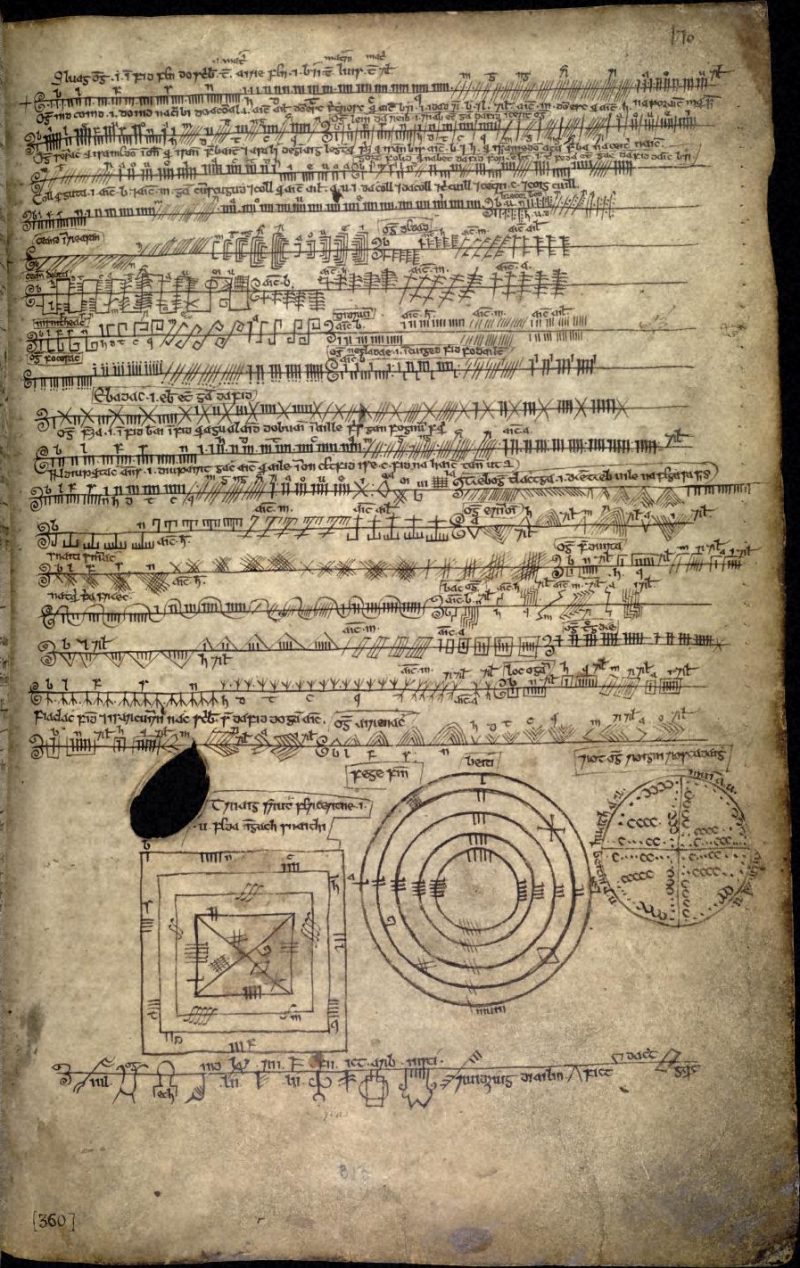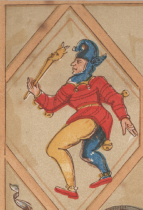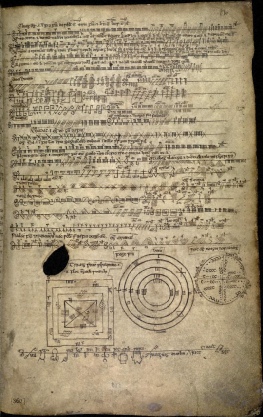Pliny, the Roman historian, wrote an interesting account of the sacred rites of the Druids,
involving mistletoe and white bulls.
They (the Druids) call the mistletoe by a name meaning the all-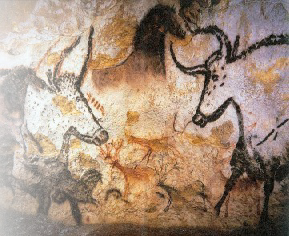
Having made preparation for sacrifice and
a banquet beneath the trees,
they bring thither
two white bulls, whose horns are bound then for the first time.
Clad in a white robe,
the priest ascends the tree and cuts the mistletoe with a golden sickle, and it is received by others in a white cloak. They then kill the victims, praying the God will render this gift of his propitious to those to whom he has granted it. They believe that the mistletoe, taken in drink, imparts fertility to barren animals, and that it is an antidote for all poisons. Such are the religious feelings that are entertained towards trifling things by so many people.
The Order of Druids was highly respected by the native British population in Kent. Caesar wrote
The Druids are concerned with the worship of the gods, look after the public and private sacrifice, and expound religious matters; a large number of men flock to them for training, and hold them in high honour.
The Druids may have continued to hold some kind of power over the native population until well into Roman times, even when Christianity was adopted as the state religion.
". . . a bull feast was made. A white bull killed, . .
." The High King of Ireland
“
The area that was known as Gaul in Roman times
includes modern France, and also Belgium, Luxembourg and western parts of Germany.
The conquest of the region by the Romans began in the 2nd – 1st centuries BC, and continued with the ‘Gallic Wars’, led by Julius Caesar, between 58 BC and 51 BC. At that time the region was also under threat from other directions – notably the Suevi and Helvetii tribes (from modern day Germany and Switzerland) – and initially it was defeating these tribes that posed the greatest challenge to the Romans.
It was in 53BC in Alesia that the final great battle took place between the Gauls and the Romans. The gauls, fighting under , were defeated by Julius caesar and the Romans, and the Romans can be considered to have occupied France from that date on. The exact location of Alesia is still debated, although the most likely location is in Burgundy at Alise-
From about 53 BC onwards the focus of the Romans in the Gallic Wars was more on suppressing a series of smaller invasions and uprisings – including 52 BC when a group of tribes led by Vercingetorix posed a significant threat to the Romans, but this threat was also defeated. (Enthusiasts of Asterix and Obelisk, the extremy popular French cartoon characters, will be familiar with this period!)
Rome then controlled the area for about six centuries, until the Roman empire itself collapsed, in the face of constant invasions.
Romans in France built a number of fine villas and, notably, introduced vines from Italy. The heyday of the Romans in Gaul was during the first and second centuries AD, when there was little unrest and the later tribal invasions from the north and east had not yet started – it was a prosperous area, with prosperity built largely on potterey, wine and food exports.
Until the Roman occupation, the predominant religion was druid based and very primitive. It was while under Roman rule that Christianity was introduced, and that
Claudius I ordered the Druids suppressed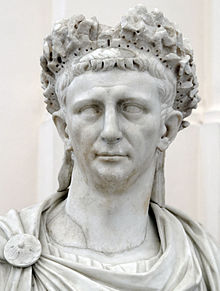
At the same time, the Gaulish language spoken underwent a fundamental transformation, and by the end of Roman rule the language spoken was a Latin based precursor of modern day French.
By the time the Romans left, to defend their homeland in the face of repeated invasions from the Visigoths, the Huns, the Vandals and others, (later as we know to prove successful), towards the end of the 5th century, the basic shape of Modern France had started to emerge. Although the Franks successfully invaded Gaul, they did little to alter the society that was by that time established. Gaul was soon established, with a King based in Paris, and the ‘modern history of France’ began.
Visiting Roman monuments in France
Orange Roman theatre, ProvenceThere are many locations in France where you can see ruins dating from the period of Roman occupation.
The greatest concentration of these, and the best place to start your exploration of Roman France, is in the south of the country near the border between Languedoc and Provence – highlights include the Pont du Gard aquaduct, the amphitheatre at Orange, and the colosseums at both Nimes and Arles, all found in
Claudius was born on 1 August 10 BC at the Sanctuary of the Three Gauls in what is now Lyon, France. He had two older siblings, Germanicus and Livilla. His mother, Antonia, may have had two other children who died young.
His maternal grandparents were Mark Antony and Octavia Minor, Augustus' sister, and he was therefore the great-
In 9 BC, his father Drusus unexpectedly died on campaign in Germania, possibly from illness. Claudius was then left to be raised by his mother, who never remarried. When Claudius' disability became evident, the relationship with his family turned sour. Antonia referred to him as a monster, and used him as a standard for stupidity. She seems to have passed her son off on his grandmother Livia for a number of years.[3]
Livia was a little kinder, but nevertheless often sent him short, angry letters of reproof. He was put under the care of a "former mule-
In 7 AD, Livy was hired to tutor him in history, with the assistance of Sulpicius Flavus. He spent a lot of his time with the latter and the philosopher Athenodorus. Augustus, according to a letter, was surprised at the clarity of Claudius' oratory.[5] Expectations about his future began to increase.
Public life[edit]
His work as a budding historian damaged his prospects for advancement in public life. According to Vincent Scramuzza and others, Claudius began work on a history of the Civil Wars that was either too truthful or too critical of Octavian[6]—then reigning as Augustus Caesar. In either case, it was far too early for such an account, and may have only served to remind Augustus that Claudius was Antony's descendant. His mother and grandmother quickly put a stop to it, and this may have convinced them that Claudius was not fit for public office. He could not be trusted to toe the existing party line.[7]
When he returned to the narrative later in life, Claudius skipped over the wars of the second triumvirate altogether. But the damage was done, and his family pushed him to the background. When the Arch of Pavia was erected to honor the Imperial clan in 8 BC, Claudius' name (now Tiberius Claudius Nero Germanicus after his elevation to paterfamilias of Claudii Nerones on the adoption of his brother) was inscribed on the edge—past the deceased princes, Gaius and Lucius, and Germanicus' children. There is some speculation that the inscription was added by Claudius himself decades later, and that he originally did not appear at all.[7]
Gratus proclaims Claudius emperor. Detail from A Roman Emperor 41AD, by Lawrence Alma-
When Augustus died in 14 AD, Claudius — then 23 — appealed to his uncle Tiberius to allow him to begin the cursus honorum. Tiberius, the new Emperor, responded by granting Claudius consular ornaments. Claudius requested office once more and was snubbed. Since the new Emperor was no more generous than the old, Claudius gave up hope of public office and retired to a scholarly, private life.
Despite the disdain of the Imperial family, it seems that from very early on the general public respected Claudius. At Augustus' death, the equites, or knights, chose Claudius to head their delegation. When his house burned down, the Senate demanded it be rebuilt at public expense. They also requested that Claudius be allowed to debate in the Senate. Tiberius turned down both motions, but the sentiment remained.
During the period immediately after the death of Tiberius' son, Drusus, Claudius was pushed by some quarters as a potential heir. This again suggests the political nature of his exclusion from public life. However, as this was also the period during which the power and terror of the commander of the Praetorian Guard, Sejanus, was at its peak, Claudius chose to downplay this possibility.
After the death of Tiberius the new emperor Caligula (the son of Claudius' brother Germanicus) recognized Claudius to be of some use. He appointed Claudius his co-
Little is known of Aulus Plautius's early career. It was previously believed that he was involved in the suppression of a slave revolt in Apulia, probably in 24, alongside Marcus Aelius Celer.[1] However, the "A·PLAVTIO" of the inscription is now associated with Aulus' father.[2] He was suffect consul for the second half of 29, and held a provincial governorship, probably of Pannonia, in the early years of Claudius's reign: another inscription shows he oversaw the building of a road between Trieste and Rijeka at this time.
Claudius appointed him to lead his invasion of Britannia in 43, in support of Verica, king of the Atrebates and an ally of Rome, who had been deposed by his eastern neighbours the Catuvellauni. The army was composed of four legions, IX Hispana, then in Pannonia, II Augusta, XIV Gemina, and XX Valeria Victrix, plus approximately 20,000 auxiliary troops, including Thracians and Batavians. In this occasion, II Augusta was commanded by the future emperor Vespasian. Three other men of appropriate rank to command legions are known to have been involved in the invasion: Vespasian's brother Titus Flavius Sabinus II and Gnaeus Hosidius Geta appear in Dio Cassius's account of the invasion; Gnaeus Sentius Saturninus is mentioned by Eutropius, although as a former consul he may have been too senior, and perhaps accompanied Claudius later.[3]
On the beaches of northern Gaul Plautius faced a mutiny by his troops, who were reluctant to cross the Ocean and fight beyond the limits of the known world. They were persuaded after Claudius's freedman and secretary Narcissus addressed them: seeing a former slave in place of their commander, they cried "Io Saturnalia!" (Saturnalia being a Roman festival in which social roles were reversed for the day) and the mutiny was over.
The invasion force sailed in three divisions, and is generally believed to have landed at Richborough in Kent, although parts may have landed elsewhere (see Site of the Claudian invasion of Britain). The Britons, led by Togodumnus and Caratacus of the Catuvellauni, were reluctant to fight a pitched battle, relying on instead on guerrilla tactics. However, Plautius defeated first Caratacus, then Togodumnus, on the rivers Medway and Thames. Togodumnus died shortly afterwards, although Caratacus survived and continued to be a thorn in the invaders' side.
Having reached the Thames, Plautius halted and sent for Claudius, who arrived with elephants and heavy artillery and completed the march on the Catuvellaunian capital, Camulodunum (Colchester). A Roman province was established in the conquered territory, and alliances made with nations outside direct Roman control. Plautius became governor of the new province, until 47 when he was replaced by Publius Ostorius Scapula.[4] On his return to Rome and civil life, Plautius was granted an Ovation, during which the emperor himself walked by his side to and from the Capitol.[5]
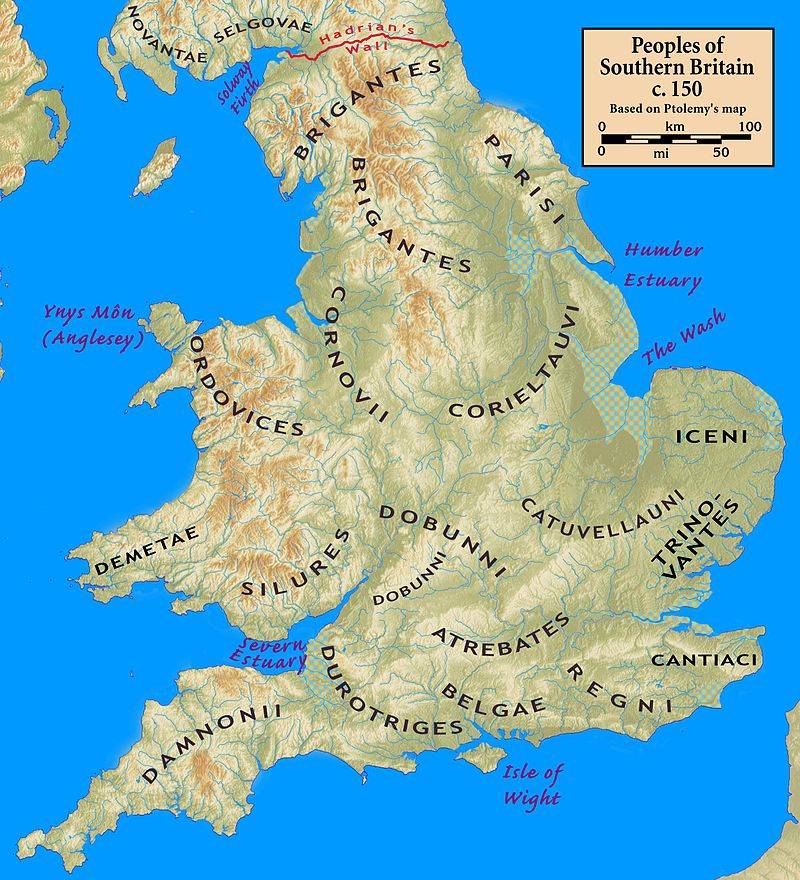
In Early Irish literature a
Bríatharogam "word ogham", plural Bríatharogaim is a two word kenning which explains the meanings of the names of the letters of the
Ogham alphabet.
Three variant lists of bríatharogaim or 'word-
dating to the Old Irish period. They are as follows:
Bríatharogam Morainn mac Moín
Bríatharogam Maic ind Óc

Bríatharogam Con Culainn
The first two of these are attested from all three surviving copies of the Ogam Tract, while the "Cú Chulainn" version is not in the Book of Ballymote and only known from 16th-
The Auraicept na n-
Later Medieval scholars believed that all of the letter names were those of trees, and attempted to explain the bríatharogaim in that light. However, modern scholarship has shown that only eight at most of the letter names are those of trees, and that the word-
Letter Meaning Bríatharogam Morainn mac Moín Bríatharogam Maic ind Óc Bríatharogam Con Culainn
ᚁ B Beithe 'Birch' féochos foltchain "withered foot with fine hair" glaisem cnis "greyest of skin" maise malach "beauty of the eyebrow"
ᚂ L Luis 'Flame' or 'Herb' lí súla "lustre of the eye" carae cethrae "friend of cattle" lúth cethrae "sustenance of cattle"
ᚃ F Fern 'Alder' airenach fían "vanguard of warriors" comét lachta "milk container" dín cridi "protection of the heart"
ᚄ S Sail 'Willow' lí ambi pallor of a lifeless one" lúth bech "sustenance of bees" tosach mela "beginning of honey"
ᚅ N Nin 'Branch-
ᚆ H Úath 'Fear' condál cúan "assembly of packs of hounds" bánad gnúise "blanching of faces" ansam aidche "most difficult at night"
ᚇ D Dair 'Oak' ardam dosae "highest tree" grés soír "handicraft of a craftsman" slechtam soíre "most carved of craftsmanship"
ᚈ T Tinne 'Iron Bar' trian roith"one of three parts of a wheel" smiur gúaile"marrow of (char)coal" trian n-
ᚉ C Coll 'Hazel' caíniu fedaib "fairest tree" carae blóesc "friend of nutshells" milsem fedo "sweetest tree"
ᚊ Q Cert 'Bush' or 'Rag' clithar baiscill
"shelter of a [lunatic?]" bríg anduini
"substance of an insignificant person" dígu fethail
"dregs of clothing"
ᚋ M Muin 'Neck', 'Ruse/Trick' or 'Love;' How about 'breath?' tressam fedmae "strongest in exertion" árusc n-
"path of the voice"
ᚌ G Gort 'Field' milsiu féraib|
"sweetest grass" ined erc
"suitable place for cows" sásad ile
"sating of multitudes"
ᚍ GG Gétal 'Slaying' lúth lego "sustenance of a leech" étiud midach "raiment of physicians" tosach n-
ᚎ Z Straif 'Sulphur' tressam rúamnai
"strongest reddening (dye)" mórad rún
"increase of secrets" saigid nél
"seeking of clouds"
ᚏ R Ruis 'Red' tindem rucci
"most intense blushing" rúamnae drech
"reddening of faces" bruth fergae
"glow of anger"
ᚐA Ailm 'Pine'? ardam íachta "loudest groan" tosach frecrai "beginning of an answer" tosach garmae "beginning of calling"
ᚑ O Onn 'Ash-
ᚒ U Úr 'Earth' úaraib adbaib "in cold dwellings" sílad cland propagation of plants" forbbaid ambí "shroud of a lifeless one"
ᚓ E Edad Unknown érgnaid fid "discerning tree" commaín carat "exchange of friends" bráthair bethi (?) "brother of birch"
ᚔ I Idad 'Yew-
ᚕ EA Ébad Unknown snámchaín feda "fair-
ᚖ OI Óir 'Gold' sruithem aicde "most venerable substance" lí crotha "splendour of form"
ᚗ UI Uillenn 'Elbow' túthmar fid "fragrant tree" cubat oll "great elbow/cubit"
ᚘ IO Iphín 'Spine/thorn'? milsem fedo "sweetest tree" amram mlais "most wonderful taste"
ᚙ AE Emancholl 'Twin-
